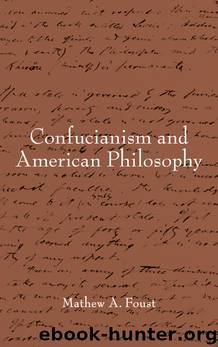Confucianism and American Philosophy by Foust Mathew A.;

Author:Foust, Mathew A.;
Language: eng
Format: epub
Publisher: State University of New York Press
Published: 2017-04-11T04:00:00+00:00
MENCIUS AND XUNZI ON HUMAN NATURE AND MORALITY
Before considering what Mencius and Xunzi say about xing, it is necessary to say a word about xing. While Slingerland renders xing “human nature,” this would be a more appropriate translation for ren xing (人性). On its own, xing does not mean “human nature,” but something more general (i.e., “a thing’s nature”). Ames and Rosemont choose “natural disposition” in Analects 5.13 and “natural tendencies” in Analects 17.2. Paul Rakita Goldin argues that Mencius and Xunzi use xing in two different ways, such that their claims about xing ought to be taken as their talking about two different things, rather than disagreeing about the same thing. For Mencius, xing “represents the natural course of development which an organism may be expected to undergo given nourishing conditions,”3 while for Xunzi, xing is far more nuanced:
Xing is what we have from birth—in other words, different forms of desire. These desires are not merely appetitive; to Xunzi, human beings desire virtually everything, and engage in all manner of unscrupulous conduct in order to gain satisfaction of their desires. To our xing belong our senses and our faculties. Xing encompasses everything which we possess without having exerted any effort to obtain it.4
As we will see in more detail shortly, for Mencius, a person’s xing is to be moral. For Xunzi, a person’s xing is just what he holds in common with all other persons.
When Mencius says that human nature is good (shan 善), what does he mean? In fact, his disciple, Gongduzi, asks him this very question. Mencius responds:
One’s natural tendencies enable one to do good; this is what I mean by human nature being good. When one does what is not good, it is not the fault of one’s native capacities. The mind of pity and commiseration is possessed by all human beings; the mind of shame and dislike is possessed by all human beings; the mind of respectfulness and reverence is possessed by all human beings; and the mind that knows right and wrong is wisdom. Humaneness, rightness, propriety, and wisdom are not infused into us from without. We definitely possess them. It is just that we do not think about it, that is all. Therefore it is said, “Seek and you will get it; let go and you will lose it.” That some differ from others by as much as twice, or five times, or an incalculable order of magnitude is because there are those who are unable fully to develop their capabilities. (Mencius 6A6)
It is clear that Mencius does not deny that people act badly. He explains bad behavior in terms of aberration from natural tendency. Our natural tendency is in the direction of humaneness (ren), rightness (yi) propriety (li), and wisdom (zhi 智). Sometimes we “let go” and allow ourselves to act in a way contrary to our natural tendency. This is not the fault of our native capacities themselves but is explainable by whatever has caused our being unable to fully develop our capacities.
Download
This site does not store any files on its server. We only index and link to content provided by other sites. Please contact the content providers to delete copyright contents if any and email us, we'll remove relevant links or contents immediately.
The Tao of Physics by Fritjof Capra(2169)
The Diamond Cutter by Geshe Michael Roach(1957)
Human Design by Chetan Parkyn(1859)
Feng Shui by Stephen Skinner(1859)
The Alchemy of Sexual Energy by Mantak Chia(1779)
Tao Te Ching by Lao Tzu(1756)
365 Tao: Daily Meditations by Ming-Dao Deng(1543)
Tao Tantric Arts for Women by Minke de Vos(1510)
Sun Tzu's The Art of War by Giles Lionel Minford John Tzu Sun(1477)
Karma-Yoga and Bhakti-Yoga by Swami Vivekananda(1437)
Buddhism 101 by Arnie Kozak(1431)
Sidney Sheldon (1982) Master Of The Game by Sidney Sheldon(1424)
The Analects of Confucius by Burton Watson(1356)
The Art of War Other Classics of Eastern Philosophy by Sun Tzu Lao-Tzu Confucius Mencius(1349)
The Way of Chuang Tzu by Thomas Merton(1294)
Tao te ching by Lao Tzu(1292)
The New Bohemians Handbook by Justina Blakeney(1287)
The Sayings Of by Confucius(1249)
Bless This House by Donna Henes(1196)
